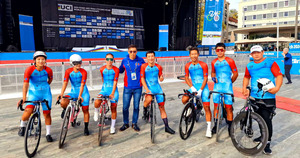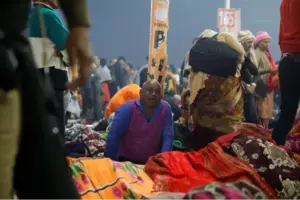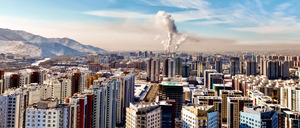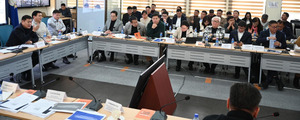
As of today, over seven hundred Vietnamese citizens reside in Mongolia with working visas. They are employed across various industrial sectors, particularly in services such as auto repair shops. While these migrant repairmen pay for their vacancy fees, very few receive social insurance coverage, and access to healthcare is rare. Most repairmen live 24 hours a day in cramped corners of their garages, often in dark, dusty rooms that resemble a rat's nest, with an unbearable smell of paint and chemicals. They rarely leave their garages and typically unwind with beer and spicy food. This is a typical lifestyle for Vietnamese migrants working in Mongolia. Therefore, journalists jointly uncovered the work and living environment of car repair workers from Vietnam.
Migrant workers are three times more likely to experience forced labour than other employees. In Mongolia, foreign citizens, especially workers without official registration and non-permanent status, are at risk of labour exploitation in agriculture, construction, handicrafts, forestry, car repair, and mining, according to a recent study done by an international organization. In some cases, those citizens are subjected to physical violence and harassment, and they are threatened with not paying their wages or reporting their document violations to the Immigration Agency of Mongolia (IAM). Participants of this research also pointed out that among these migrant workers, Vietnamese people who work in auto repair shops are at a high risk of such human rights violations.
Despite the circumstances, the authorities in Mongolia have only checked the residence permits of migrant workers and have not taken any measures to ensure that their human and employment rights are protected. For the past 12 years, their basic rights to work and live in a healthy and safe environment have been neglected.
The typical relaxation space for Vietnamese repairmen is often a concealed room connected to the garage. If the room has a wooden table and enough space for two extra chairs, it is considered a "great" place. Leftover bones, pots of noodles, dirty cups, spoons, and food waste are commonly scattered across the table. The blankets and mattresses on the bed appear not to have been washed in months or even years and are heavily stained. One man in particular, staring at his phone screen with boredom, is named Nguyen Kim. He shared that he has not returned to Vietnam in the five years since he came to Mongolia with his work partner, Chang Bang Zang.
He misses his country of course a lot, but if he wants to go back there, he said that he has put up with it for many years because he needs more than two million MNT in cash (approximately USD 600), including travel expenses and visa fees. The workplace is too dirty, with a musty garage covered in mud, and dust and full of trash. However, they work without any complaints.
Many auto repair shops in Ulaanbaatar, the capital city of Mongolia are tagged as ‘Vietnamese service’ because it became well-known in Mongolia. Vietnamese car repair shops are located in every corner of the city, such as the Tsaiz market, the Zuun Ail area, the 1st, 2nd, and 3rd micro district regions, and Denjiin Myanga residence places. Employers of those migrant workers are very satisfied, therefore, they proudly said a word of Vietnamese workers as "responsible”, “hardworking”, and “persistent" when they speak about Vietnamese workers. But those workers were left behind in the garage from morning till noon, doing their tasks, sleeping, eating, washing, and moping in their garages. Their duty is almost timeless and limitless. At best, go from one auto repair shop to another. The working environment is noisy and dirty, and some are even disgusting. The smell of paint and chemicals are strong and fogged up in a cloud of dust and stung eyes. Electric wires ran through the floor, and water was standing in the broken part. But auto mechanics don't have coveralls that ensure their safety, and very few of them wearing masks.
The migrant worker works from morning till night and goes to his "hidden" space in some corner of the garage just to sleep. Around three steps, no more, no less, is their private space in the corner of the garage. Some workers’ space is probably less than that. The environment is dusty and ash-grayed with no ventilation and poor hygiene. Only one or two of them live in public housing. But in terms of hygiene, nothing is better than others. They said that they came here only to sleep. Some have rooms that are accessed through the garage's vents. They work and live in an environment that does not meet the minimum occupational safety and hygiene requirements. Still, because of their lack of awareness about Mongolian standards, workers do not make any complaints and they cannot even receive any social services.
HOW THEY WORK
Most of them answered that their car repair shops' regular timetable is from 10.00 am to 1.00 am or from 12.00 pm to 02.00 am. Mechanics usually work 14 to 15 hours a day, and when and if it’s necessary, they work all night without sleeping. When there is an overloaded customer, it is possible to work 24 hours a day. Many of the workers do not rest even on Saturdays and Sundays. In other words, they work more than 100 hours a week.
However, the Labour Law of the country stipulates that the normal working day of an employee should not exceed eight hours a day, and the working hours of a week should not exceed 40 hours. Also, the maximum number of overtime hours per day is not more than four. Therefore, the maximum working hours per week should not exceed 56 hours. However, only one or two car repair shop owners mentioned that workers rest on one day of the week. Most of them work during the week without any holidays. However, overtime is not paid. They are already used to it. He also said that he would not complain since he had come to collect money. He wants to collect as much money as possible and go back home.
One car is just finished the next one comes in or they are just waiting in line one after another. He said he rarely has free time. After working like this, some workers earn more than two million per month. He keeps one million MNT in his hand and the rest in his account in Vietnam. It's been a long time, more used to the job, with a marginal salary. They work with the same pay conditions and slightly different ratings. He gets 8-10 million MNT based on the number of cars he repairs, or a percentage of his income. 10 million MNT are paid to skilled repairmen who repair overturned, crashed, and damaged vehicles until a fix to a "brand new". In general, the average salary is three million MNT. Salary will be received once a month. It is unknown whether a labour contract was signed or not. Some workers said that they signed a contract, but they could not find any copy of the contract either in Mongolian or English from the employer, employee, or official.
INSTANT NOODLE EVERY DAY...
One of the corners of the garage is ‘owned’ by a refrigerator, a food preparation board, and a vegetable and rice rack. Almost all garages are the same. Those who have found spare time between car repairing will cook their meal. However, meals are cooked in dusty, dirty, open-air environments that do not meet minimum hygiene standards. They usually buy food from nearby shops. If they are busy, they will eat instant noodles only. The noodles were stored in boxes. There is no other option for lunch. It also repeats at dinner time as well. Well-paid repairmen can order food in bulk from ‘Ikh Nayad’ plaza a grocery food delivery service. In other words, a Vietnamese food delivery network was created, too that supply to auto repair workers mainly. The reason is that Vietnamese people cannot eat Mongolian food, which is fatty, oily, and with heavy meats. In general, Mongolian co-workers are not able to prepare meals for them, so no matter how many hours they work and how tired they are, they usually eat meals with vegetable ingredients. We’ve met several Vietnamese people who keep dogs and chickens in their garages. They said they were raising them for food supply.
MEDICINES TAKEN WITHOUT A PRESCRIPTION
Very few Vietnamese repairmen answered that they have health insurance coverage. So, when they are getting sick, they usually go to the local pharmacy. Sometimes migrant workers find medicine from other workers. Taking medicines and injections is the only way to ‘cure’ the disease without having any prevention. In case of emergency, they are reaching to a private hospital. After entering the border, they undergo a medical examination at a private hospital to apply for a residence visa. It is here that the old medicine is curled up next to the mattress in their living space.
Medicines are found everywhere: on the dining room table, in the garage, and on the small windlass. It is reported that some individuals take medicine without consulting a doctor or obtaining a prescription, relying instead on common symptoms. Occasionally, Mongolian owners provide medicine for them. In addition to lacking health insurance, these individuals also do not contribute to social insurance.
According to Article 43.2.7 of the Labour Law, employers are required to ensure that employees have social and health insurance, pay the necessary premiums as stipulated by law, and verify that these payments have been made. If Mongolia is collecting vacancy fees from employers, should there not be a greater focus on the health and social security of these migrant workers? Should employers be responsible for covering their insurance?
THERE IS A LOT OF EXPOSED TO CRIME AND ATTACKS
Many Vietnamese mechanics face bullying from various individuals. Street alcoholics are often considered the "hardest people" due to their experiences. These alcoholics frequently steal food from mechanics, while other bullies rob them of their cash. Some customers look for minor mistakes—such as incomplete repairs or delays—and may resort to violence, beating or even attacking the mechanics to demand free repairs. This aggression often results in injuries, including cuts, broken noses, and facial bruises, leading some to seek treatment at the National Center for Traumatology. Unfortunately, the center does not maintain records of injuries involving foreign nationals and does not compile statistics by country. Moreover, members of the nationalistic extremist group known as "Upright Blue Mongolia" sometimes visit the mechanics, adding to the difficult situation they face. To increase security, a few auto repair shops have installed cameras.
Some auto repair shops have security personnel present from start to finish throughout the workday, and many of these guards are women. It used to be repairmen who always worked at night. But there are many inns, bars, and cafes around the auto repair shop. That's why 'hooligans' are more likely to go to car repair shops and cause problems. During busy periods, Mongolian employees tend to stay at the shop overnight to manage the workload, while also keeping track of the number of cars that have been repaired.
Going a little off-topic, a year ago, a second-year Vietnamese student at the National University of Mongolia became a victim of robbery, extortion, and rape. Recently, the trial for three individuals accused of raping the 18-year-old Vietnamese girl took place in the Criminal Court of Bayanzurkh District. It has been reported that a representative from the Vietnamese Embassy in Mongolia did not attend and will not participate in the court hearings. Because of this lack of attention from the embassies, the Mongolian lawyer also chose not to attend the proceedings. The pro bono attorney noted several issues: the victim's phone number was unavailable, she was not at her registered address, and she did not appear in court herself, which left the lawyer unfamiliar with the case file. The victim expressed her decision not to participate in the trial, stating, "I do not want to see the criminals again."
The police provided information on recent crime statistics, stating that in the past five years, a total of 19 Vietnamese citizens have been victims of crime, while seven Vietnamese nationals were implicated in criminal activities. In the first half of this year alone, three Vietnamese citizens sustained injuries. A notable incident occurred on September 29, 2023, when a group of individuals attacked a Vietnamese repair shop in the Bayanzurkh district, robbing the owner of 200,000 MNT to purchase a mobile phone, paint, and chemicals.
WHAT HAPPENED TO THEIR PERSONAL DOCUMENT
During this reportage, we encountered several undocumented Vietnamese citizens who were being held hostage. Many of them saved pictures of their documents on their phones. When I asked why they don’t carry these documents with them, several responded, “The Mongolian boss knows.” I spoke with the Mongolian owner, who claimed, “I took it temporarily to extend the visa.” However, according to the picture on the phone, the visa had not expired yet and still had 45 days remaining. This means their documents were confiscated a month and a half ago under the pretense of extending their visa. Generally, most of the repair workers we spoke with either showed pictures of their documents or communicated with "the boss," waving their phones as they did so. The owner I spoke with reiterated that the visa was taken to be extended.
When we contacted the Ministry of Foreign Affairs for clarification, they informed us that a visa extension typically takes five working days. Additionally, when some repairmen requested access to the room, they were told, "There's no key; the owner has it." The owner takes the key in the morning when he comes to work and returns it at night before going to bed. Regarding the employers, they explained to the migration authority that "Vietnamese employees sometimes take their documents because they tend to gamble."
WHAT THE MONGOLIAN OWNERS SPOKEN
If the personal documents of the migrant repairmen are not in their possession, we contacted the Mongolian owners to inquire whether it is possible to view the documents and report on them. Some of the owners responded, "He doesn't have to answer." One owner, Uuganaa, whose phone number ends in 9194, said, "What permission do you have? Who is the name of the official from the Ministry of Social Welfare and Labor accompanying you? I will only speak to the Ministry of Social Welfare and Labor; I won’t talk to you."
B.T., the owner of a garage located in the Sukhbaatar district, operates with a dual role. When I interviewed a woman married to a Vietnamese man about whether the repairmen manage to prepare food in such an unsanitary environment, she stated, "People have their own right to decide what to eat and drink in such an environment." In other words, the women utilizing their garages—who earn 20 percent of their income—do not prioritize the health and safety of these workers.
The migrant workers' hiring and sending process is informal and unclear
Employer: I understood, there is a separate company that operates to hire and send migrant workers to Mongolia, but I don’t know the name of the exact company. Whoever, Vietnamese people reach out to us and we hire them. Many Vietnamese workers have been working in Mongolia for more than a decade, so they also connect with their acquaintances. For us, we are open until 02.00 at night. Their salaries are around 4-5 million MNT (USD1300). We offered them private hospitals.
WHY ARE MIGRANT REPAIRMEN SO PATIENT?
The value of labor and wages is relatively low in Vietnam. Also, the labor market is extremely competitive in a country with a population size of about 100 million. According to them, it is almost impossible to find a job. There, a citizen who graduated from a secondary education school earns a monthly salary of at most 1.4 million MNT, Mongolian currency. In the country, the bumper of one car is repaired for 50,000 MNT, but here it will cost 250-300,000 MNT. Repairmen working in Mongolia can earn at least 2-10 million MNT per month. They said repairmen usually had at least 1-3 children with a family.
Nguyen, the repairman we met, explained that he sends his entire salary directly to his family. His wife is seriously ill, and they have three children aged 2 to 16, all of whom are too young to work. As a result, he works day and night to earn as much money as possible. He prioritizes his family's needs over his own health and social security. Also, the repairman, who introduced himself as Chu, came to Mongolia not long after his marriage. It has been three years since he left his wife. He has not yet seen his baby, back at home. Therefore, it doesn't matter whether the working conditions are difficult, or health problems arise, migrant workers aim to earn extra money and go home quickly. This way, everyone lives and works in Mongolia with their sufferings and happiness. They are devoted parents and husbands, fully committed to their family responsibilities. Adapting to Mongolia’s unsuitable weather and food, along with a lack of access to health services, proves difficult at first. Nevertheless, they endure these hardships to send money to their families. Nguyen often forgets his fatigue, expressing how much he longs for his homeland, home, and children. He even pays extra each month for his mobile phone to make regular video calls.
MANY OF THE EMPLOYERS IN THE AUTO REPAIR INDUSTRY ARE VIETNAMESE CITIZENS
Some Mongolian business owners operate five or even ten auto repair shops, but one Vietnamese family stands out as the largest network, owning about 30 branch shops. During our research, we attempted to meet the owner 3 to 4 times, but unfortunately, we were always met with closed doors because he was frequently visiting different locations. In addition to this major owner, there are several other auto repair shops owned by Vietnamese citizens. Many of these owners have apartments and cars in Mongolia, and some are married to Mongolian wives. Meanwhile, in Vietnam, the owner's children are pursuing their education at colleges and universities. However, it has been noted that many Vietnamese people are often compelled to work in Vietnam for low wages and poor living conditions.
WHERE AND HOW DID HE GET HIS PROFESSION
In the general education schools of the Socialist Republic of Vietnam, vocational training is provided with a high level of quality. As a result, students in mainstream schools graduate with a vocational degree in various fields. By this standard, one can only graduate from high school with a degree in auto mechanics. However, there are limited job opportunities available in their home country. Consequently, many Vietnamese people work abroad. Some have found themselves in Mongolia due to this situation. Interestingly, not all of them have traveled extensively throughout Mongolia; many have never even visited the central square. They typically return home once a year, usually during the White Moon, which marks the lunar New Year. For them, this time represents a moment of relaxation and relief.
Meanwhile, our reporters team aims to clarify how the ministry and agencies enforce the law and how they conduct their inspections

On September 13, a delegation of politicians led by Member of Parliament Erdenebat S. visited the Socialist Republic of Vietnam. During the visit, our representatives met with members of the Young Members Group of the Vietnam National Assembly and the Standing Committee on Public Policy to discuss health and employment issues. Earlier this year, in April, the Mongolian Trade Union and the Vietnam Trade Union conducted reciprocal visits to commemorate the 70th anniversary of diplomatic relations between the two countries. In this context, there appears to be an increase in meetings, conversations, and discussions between two nations.
I would like to ask Erdenebat S., who represents the Mongolian Trade Union, about the efforts made by the Union over the past 70 years regarding the labor policies of both countries. Specifically, I am interested in whether there have been any changes in protecting the interests of workers, improving working conditions, and providing social services.
On the other hand, the Vietnamese repairmen did not know who the ambassador of their country to the Republic of Mongolia was. In other words, the embassy did not seem to care much about how the people lived, worked, and stayed. More importantly, the report found that employers who are supposed to provide them with safety and government officials who are tasked with enforcing the law and monitoring regulations are not doing their jobs very well.
HERE'S WHAT THE OFFICIALS HAD TO SAY




ENKHJARGAL: THERE HAS BEEN ONE INSPECTION SINCE THE PANDEMIC
Does the Ministry of Family, Labour and Social Welfare has a database on exchange of digital data and information and functions to promote Labour Migration Laws? Citizens and employers are less informed about this.
- We promote the Law on labour migration effectively. Local and provincial regulations are regularly enforced. In contrast, employers must take responsibility for understanding the relevant laws. The working conditions of Vietnamese repairmen have not been inspected for the past 12 years.
SUNJID D: THE PLACES THAT REGISTER, AUTHORIZE, AND CONTROL ARE REQUIRED TO DO THEIR WORK
(Chairperson of the National Human Rights Commision)
 The situation faced by Vietnamese migrants represents a violation of their right to work. In the Republic of Mongolia, everyone is entitled to equal rights under the law. Beyond occupational safety, their rights to well-being, health, and security are also significantly impacted. First, it is essential that the authorities responsible for registering and issuing permits fulfill their duties effectively. Second, these individuals need to be informed about the process for filing complaints regarding the exploitation of their rights. Most importantly, efforts must be made to resolve the ongoing conflicts. Protecting the right to work, safeguarding against forced labor, ensuring occupational safety, eliminating violations, and addressing grievances are critical for individuals to live free from any form of assault.
The situation faced by Vietnamese migrants represents a violation of their right to work. In the Republic of Mongolia, everyone is entitled to equal rights under the law. Beyond occupational safety, their rights to well-being, health, and security are also significantly impacted. First, it is essential that the authorities responsible for registering and issuing permits fulfill their duties effectively. Second, these individuals need to be informed about the process for filing complaints regarding the exploitation of their rights. Most importantly, efforts must be made to resolve the ongoing conflicts. Protecting the right to work, safeguarding against forced labor, ensuring occupational safety, eliminating violations, and addressing grievances are critical for individuals to live free from any form of assault.
MR. SARANTSASRAL: WE ARE READY TO DEFEND VIETNAMESE WORKERS' RIGHTS IF THEY MAKE COMPAINTS
"AUTO REPAIR SHOPS WITH THE OFFICIALLY AUTHORISED WORKING CONDITIONS ARE RARE"
We interviewed an official source who has been conducting inspections of Vietnamese repear shop facilities for several years.
- It is common for Vietnamese citizens working and living in Mongolia to be undocumented. What is the reason for this?
-During the inspection process, the passports and residence permits of Vietnamese repairmen will be reviewed. This is where the problems arise. First, many repairmen do not have their personal documents with them. Some auto mechanics try to show pictures of their documents on their cell phones. By law, they are required to carry either a foreign passport or a Mongolian residence permit. Failure to do so results in fines. "Various factions in Mongolia and the police are collecting documents," said the repairmen who work in Vietnamese repair shops. They report being bullied and charged money while being pressured to fix cars for free. One repairman expressed fear of being taken advantage of, noting that they primarily work at night, making them vulnerable to any kind of attack. They are often convinced that their documents will not be collected, and as a result, some do not come out of hiding at all. When asked about missing documents, they often respond, "The boss has it." Typically, the boss is Mongolian, and there seems to be an interest in confiscating as many documents as possible. Furthermore, there is no review of the workplaces affiliated with these repairmen, leaving them unaware of which companies they are associated with.
-What laws of our country does the confiscation of documents violate?
-By confiscating their documents, employers are restricting workers' right to travel. This practice is not only a violation of human rights but also constitutes human trafficking and forced labour. Workers have the right to stop working and return to their homeland. Additionally, a Vietnamese citizen's passport is not the property of the Republic of Mongolia; it is state property belonging to the Republic of Vietnam. This misunderstanding could lead to diplomatic problems between the two countries.
Visas for Vietnamese citizens can be extended for five working days and may also be extended electronically. Documents should not be confiscated to extend a visa for one month prior to expiration. International conventions prohibit the confiscation of workers' personal documents, excessive overtime, wage deductions for bail, and restrictions on free travel. We have discovered that Vietnamese workers are paid in uneven ratios, such as 60/40, 70/30, or 20/80, compared to their Mongolian employers. When discussing payment with their employers, repairmen often use their own income to cover rent, utilities, garage fees, and food expenses. This situation is concerning, as my visa has been repeatedly extended for months. Only a few companies extend visas year after year; the majority grant extensions for just two or three months.
-We have seen the conditions in which they work and live. Doesn't that sound like a good idea?
-By confiscating their documents, the authorities are restricting the right to travel for these individuals. It is the responsibility of the State Inspector of Labor to oversee workplace conditions. Unfortunately, our Agency for Social Welfare and Labour has not had a professional labor inspector for a long time. The Ministry of Family, Labour, and Welfare is the only authorized body in charge of this issue; however, the agency is the one that issues employment permits. Since 2012, I have attended several working group meetings related to foreign nationals and migrant workers, but there has been no involvement from the labor inspector. This is a significant weakness, as it means there is no one available to monitor working conditions and wages for these workers.
In the EU, 51,000 Mongolian citizens are employed under formal contracts. When including informal workers, this number rises to around 70,000. Like many Vietnamese citizens, they have left their homes to work remotely. In contrast, our citizens have the ability to file complaints and defend their rights if they are violated. They can reach out to the Embassies and Consulates of the Republic of Mongolia in Vietnam, as well as the National Human Rights Commission of the Republic of Mongolia and the Association of Mongolian Trade Unions. These organizations provide support and assistance for their concerns.
In 2005, Mongolia ratified ILO Conventions No. 29 of 1930 and No. 105 of 1957, which pertain to the Abolition of Forced Labour. Next year will mark the 20th anniversary of their endorsement. Additionally, our country has established a legal framework to protect the rights of foreign citizens. For instance, the Parliament has approved the Law on Labour Migration, the Labour Law, and the Law on the Status of Foreign Nationals. Unfortunately, these conventions are not being enforced, nor are the domestically adopted Labour Law and the Labour Migration Act. Employers and some legal entities continue to willfully or inadvertently violate these regulations. If this trend persists, Mongolia's reputation in various countries may suffer, and the foreign workforce could be negatively impacted. Conversely, our country continues to require a skilled foreign workforce.
In conclusion, discussions between Mongolian and Vietnamese government officials began in the early 2010s to negotiate a social welfare and protection agreement. However, there has been little progress in these negotiations so far. For example, in 2012, Vietnamese representatives, led by the Vice Minister of Social Protection and Labour, visited Mongolia to discuss collaborative efforts aimed at ensuring that workers from both countries are fully included in social insurance and social security systems.
Consequently, the two countries continue to operate without a "Social Security Agreement" and without "immunity" from health and safety to working citizens in the two countries...
Name of the press: ‘Unuudur’, a daily newspaper, a Mongolian national news outlet
Date of post in the daily newspaper online:
- Article series 1. 13 September 2024. https://www.unuudur.mn/a/271187
- Article series 2. 26 September 2024. https://www.unuudur.mn/a/271429
- Article series 3. 30 September 2024. https://www.unuudur.mn/a/271457
Name of the Authors: Myagmarjargal Dashdorj, Enkhbayar Zorigtbaatar and Ichinkhorloo Arivsan










































































































